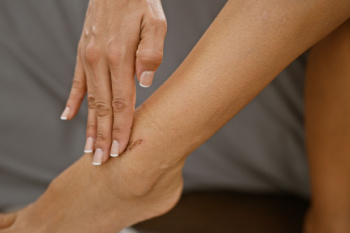 Open wounds on the feet are injuries where the skin is broken, exposing underlying tissues. These wounds can vary in type, including cuts, abrasions, lacerations, punctures, and ulcers. Cuts and lacerations often result from sharp objects, while abrasions are usually caused by friction or scraping against rough surfaces. Puncture wounds occur from stepping on pointed objects. Ulcers are typically associated with poor circulation, diabetes, or prolonged pressure. Open wounds on the feet require prompt and appropriate treatment to prevent infection and promote healing. Initial care involves cleaning the wound thoroughly with mild soap and water, followed by applying an antiseptic. Keeping the wound covered with a sterile bandage and changing it regularly is critical. If you have an open foot wound, it is strongly suggested that you schedule an appointment with a podiatrist who may need to debride it, prescribe antibiotics, and in some cases, stitch up the wound or do surgery to ensure proper healing and prevent complications.
Open wounds on the feet are injuries where the skin is broken, exposing underlying tissues. These wounds can vary in type, including cuts, abrasions, lacerations, punctures, and ulcers. Cuts and lacerations often result from sharp objects, while abrasions are usually caused by friction or scraping against rough surfaces. Puncture wounds occur from stepping on pointed objects. Ulcers are typically associated with poor circulation, diabetes, or prolonged pressure. Open wounds on the feet require prompt and appropriate treatment to prevent infection and promote healing. Initial care involves cleaning the wound thoroughly with mild soap and water, followed by applying an antiseptic. Keeping the wound covered with a sterile bandage and changing it regularly is critical. If you have an open foot wound, it is strongly suggested that you schedule an appointment with a podiatrist who may need to debride it, prescribe antibiotics, and in some cases, stitch up the wound or do surgery to ensure proper healing and prevent complications.
Wound care is an important part in dealing with diabetes. If you have diabetes and a foot wound or would like more information about wound care for diabetics, consult with one of our podiatrists from Lexington Foot and Ankle Center, PSC. Our doctors will assess your condition and provide you with quality foot and ankle treatment.
What Is Wound Care?
Wound care is the practice of taking proper care of a wound. This can range from the smallest to the largest of wounds. While everyone can benefit from proper wound care, it is much more important for diabetics. Diabetics often suffer from poor blood circulation which causes wounds to heal much slower than they would in a non-diabetic.
What Is the Importance of Wound Care?
While it may not seem apparent with small ulcers on the foot, for diabetics, any size ulcer can become infected. Diabetics often also suffer from neuropathy, or nerve loss. This means they might not even feel when they have an ulcer on their foot. If the wound becomes severely infected, amputation may be necessary. Therefore, it is of the upmost importance to properly care for any and all foot wounds.
How to Care for Wounds
The best way to care for foot wounds is to prevent them. For diabetics, this means daily inspections of the feet for any signs of abnormalities or ulcers. It is also recommended to see a podiatrist several times a year for a foot inspection. If you do have an ulcer, run the wound under water to clear dirt from the wound; then apply antibiotic ointment to the wound and cover with a bandage. Bandages should be changed daily and keeping pressure off the wound is smart. It is advised to see a podiatrist, who can keep an eye on it.
If you have any questions, please feel free to contact our offices located in Harrodsburg, Frankfort, Georgetown, and Lexington, KY . We offer the newest diagnostic and treatment technologies for all your foot care needs.